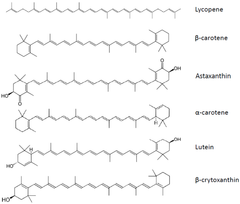Your skin needs carotenoids for a number of health benefits. Carotenoids are potent antioxidants and so prevent damage to skin cells from free radicals. Carotenoids also help stimulate production of collagen and elastin fibers in the skin to decrease the appearance of wrinkles and other signs of aging skin.

What are Carotenoids?
Carotenoids are pigments found in a number of plants. They are yellow, orange, or red colored, fat-soluble pigments that give color to plants including autumn leaves. There are over 700 different carotenoids identified by chemists. Plants use these molecules to help absorb light that is then used for photosynthesis as well as for antioxidants.

You may have been hearing since you were a child to eat your carrots so you can see better. Lutein and the two zeaxanthin isomers are carotenoids that are actually part of the retina of the eye where they protect the retina, help prevent macular degeneration, and enhance vision.
Two broad classifications of carotenoids are carotenes (orange) and xanthophylls (yellow). But they can also be classified as compounds that can be transformed by the body to create vitamin A (retinol) or those that do not.
Vitamin A and Carotenoids
Vitamin A is important for skin as it assists in the regeneration of tissue, preventing the degeneration of the epidermis. Carotenoids are part of the same family as Vitamin A and many of them are converted to vitamin A in the body. Provitamin A carotenoids include alpha-carotene, beta carotene and beta-cryptoxanthin. Other carotenoids such as lutein, zeaxanthin and lycopene are not transformed into vitamin A but have other important roles.
Sunlight causes damage to the skin and carotenes can help protect the skin against this damage. Carotenoids can stimulate collagen and elastin in the skin to increase its density, elasticity and firmness. In addition carotenoids can repair and regenerate these protein fibers after damage by UV light. Carotenoids help stimulate epidermal regeneration helping to soften and smooth skin. They also reduce water loss so help hydrate. Carotenoids can help reduce skin pigmentation by decreasing the size of melanocytes and melanin levels. Thus addressing hyperpigmentation caused by UV radiation, hormones or even acne.
Overall, carotenoids can help protect skin against premature aging caused by UV exposure. Some types of carotenoids can actually absorb UV light thus protecting skin against burning. All this makes carotenoids a powerful anti-aging and skin repair ingredient in cosmetics.
Carotenoids in Herbs
We use herbs that are rich in carotenoids in our products including calendula. Over 19 different carotenoids have been identified in calendula including lycopene, gamma carotene, flavoxanthin, lutein, and beta carotene. This may explain why calendula has such a history of use in skin care. You’ll find calendula extract in our Springtide Face Creams, Mountain Mist Hand and Body Lotion, Sole Pleasure Foot Butter and Knuckle Balm. Another herb rich in carotenoids is parsley. You’ll find this in our Parsley Eye Serum.
Smoking, lack of sleep, alcohol consumption, illness, UV light and infrared radiation (heat) all decrease the levels of carotenoids in the skin. Studies have shown that skin that is high in carotenoids looks considerable younger than skin depleted in carotenoids. Skin benefits from both topical and oral carotenoids.
For more information read: https://www.ncbi.nlm.nih.gov/pmc/articles/PMC6264659/

Thanks for the information. I try to make sure I have colorful meals. Good to know the truth about carrots not being an old wive’s tale.
Detailed information, thanks for sharing. I did not know there were so many carotenoids.